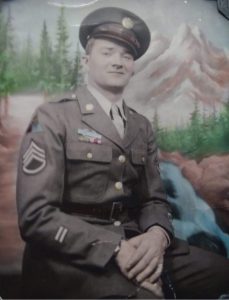By Joshua Harris, FCHS Mass Media Student
 It was a cold December night in France, 1944. Climeth Layman lay awake in a bunker. His only job was to call in the artillery should the Germans arrive.
It was a cold December night in France, 1944. Climeth Layman lay awake in a bunker. His only job was to call in the artillery should the Germans arrive.
Two days earlier, Layman’s lieutenant had stopped by and given him the supplies he needed to call in an artillery barrage. The lieutenant told the young staff sergeant to keep watch because they didn’t know what the Germans had up their sleeves. He told Layman to “be prepared for anything.”
“That night,” Layman said, “everything was so quiet and so dark outside and I was just sitting there in the bunker. Then, I heard a motor start up.” He described the sound with a shudder. “Then I heard another engine. And another.” Then, he heard a sound he´d trained himself to listen for, the last thing he wanted to hear at that moment.
It was the sound of men’s voices speaking German.
“I heard guys calling. It sounded like they were giving orders in German. But it was so black you couldn’t see your own hand in front of you.”
Layman scrambled to his feet. He needed to call in an artillery barrage to take out the Germans before the Germans could take out the supplies his unit was in charge of bringing to the men on the front. What happened to Layman next was just one of many stories that this 102-year-old has to share with today’s youth.
Layman was born in a small town in Missouri during the Spanish Flu Pandemic of 1918. Life then was a far cry from today’s world. He tells how one Easter in 1922 he and his family heard a strange noise in the distance outside their home.
They ran outside and to their amazement, saw a speck in the sky. “It looked like it was coming toward us and it was getting bigger. The noise was getting louder too, but we had no idea what it was.”
Later that same day, at Easter Sunday service, it was all anyone was talking about: the first plane to fly over their county, a one-man biplane. “We wondered if someday they´d be able to fit two men in one of those things,” says Layman.
The WWII veteran says things were different back then. “Everyone had a job. Even kids as young as 10 years old. We all worked to help the family.”
When the U.S. entered World War II, Layman joined the fight, along with millions of Americans. He served in the U.S. Army’s 10th Armored Division.
At first, he started out teaching other soldiers how the different guns worked, but he didn’t do that for long. His superiors, who were impressed with his leadership skills, gave him promotion after promotion. Although most soldiers would jump at the opportunity to get a promotion, Layman was content with the lesser responsibilities that came with his initial position.
“Just give me a pick and a shovel and I’ll go out there and dig the ditches,” he remembers saying when he was first promoted. “They shook their heads and told me, ‘We know what we’re doing.'” Eventually, he found himself in the position of staff sergeant in charge of an anti-tank unit.
It was sometime not long before the infamous Battle of the Bulge (the last major German attempt to reclaim the lead in the war) when Layman found himself in that dark bunker, listening to the sounds of German tanks and enemy soldiers shouting orders in a language he couldn’t understand.
The voices kept getting closer and Layman decided he would have to call in the artillery barrage his lieutenant told him was at the ready. He got up and rushed to call it in. At first, he recalls, he had trouble getting through. Eventually, he did get through and called for support from the air.
“I waited for so long,” Layman said, “I started to think they’d missed the mark.” Finally he heard the shells screaming in overhead. “It was nice to hear that sound when you knew it was from your side.” Layman said the artillery barrage lit up the night for miles around. “After a while everything went real quiet and I never heard no tanks or hollering for the rest of the time I was there,” he added.
The next day, Layman and his unit were relieved of their post and rotated off the line.
He said he regretted never looking out over the countryside to see the effects of all that artillery he’d called in. “I don’t know why, but I wish I saw what it looked like down there,” he said. “I never did know exactly what I did when I called that in, but I know it was a big deal.”
Eventually, Layman was sent home due to a bad case of trench foot, a common condition among soldiers during the war which could result in painful, damaged feet. Now, he lives in a small town in Missouri and he continues to share his stories with new generations.
Layman has received countless awards and honors for his exceptional service, including a World War II Victory Medal, and a Bronze Star.
What advice does Layman have for young people today? ¨Stay honest and don’t get into drugs,” he said, “[and] appreciate your freedoms and do not let them be taken away from you.¨
(Editor’s Note: Ever since Fluvanna County High School student Josh Harris sat in his living room listening to his great grandfather tell stories of his time in the Navy during World War II, he has had a great interest in the people who took part in defending the world from the Axis powers. Almost four years after his great grandfather’s passing, Harris decided he wanted to keep stories, like the ones he heard from his great grandfather, alive by sharing them with his peers. In early 2020, Harris joined a Facebook group, “Children & Families of WW2 Vets.” Through this group, he began corresponding with Climeth Layman’s daughter, Willie Layman, and got the opportunity to interview him for this article.)




